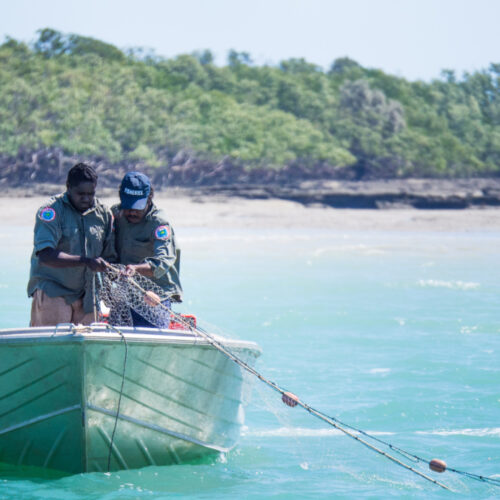
- Reference # AT.4.2223007
- Project Status Current
- Timeframe 4 years (2022 - Oct 2026)
- Project manager Anthony Curro
- CRCNA Funding $1,913,500
- Total project value $4,092,534
- Project research participant Aboriginal Sea Company; Wild Barra Fisheries Pty Ltd
- Research Programs 4. Building industry and capacity in Northern Australia
- Location Cobourg, Ramingining, Numbulwar, Elcho Island, Port Keats, Maningrida, Tiwi Islands, Ngukurr, Gapawiyak, Darwin, Gove
- First Nations led business development
- Aquaculture
Summary
This research led by the Aboriginal Sea Company aims to identify the specific needs and barriers faced by Traditional Owners’ (TOs) to effectively participate in resource management and harvest on their sea country and develop tailored strategies to address these gaps. This would help ensure TOs have greater ownership and investment in resource management initiatives and can contribute to the sustainable management of marine resources in their sea country.
The project will support the development and growth of Indigenous businesses and initiatives, through increasing the skills, capacity, and capability of Indigenous people in the commercial fishing industry, ultimately leading to greater economic self-sufficiency and prosperity for Indigenous communities. It will investigate the potential of an Indigenous fishing cooperative as a way to facilitate greater economic participation within this industry.
Expected outcomes
Outcomes of the project include:
- Creating workplace environments in the seafood industry that align to Indigenous values by purchasing the relevant fishing or aquaculture licences.
- Indigenous JV’s with seafood industry that share the same values as Indigenous values.
- Creating more job opportunities, particularly in remote coastal communities where majority of population is Indigenous and unemployment is approx. 50%.
- Develop an Indigenous specific ‘seafood marketing’ brand, supported with tools and various multi-media platforms, which then provides additional training and employment opportunities for Indigenous people that may not want to do fishing or aquaculture.
- Create ‘downstream’ business opportunities for Aboriginal people such as multi-media, cultural tourism (aligned with fishing tourism), marketing through Aboriginal lens (such as artwork and branding designs)
- Local sales of affordable seafood into remote communities which provides healthier alternative eating, value-adding to existing seafood products with local Aboriginal flavours (bush foods and spices).
- In addition, engaging with partners that have shared values that include ‘environmental’ social licence so that we are seen as environmental stewards. This will reduce impacts by improved fishing practices, reduce carbon foot prints, low tech aquaculture and improved ‘biodiversity’ by utilising any by-products regardless of monetary value.

